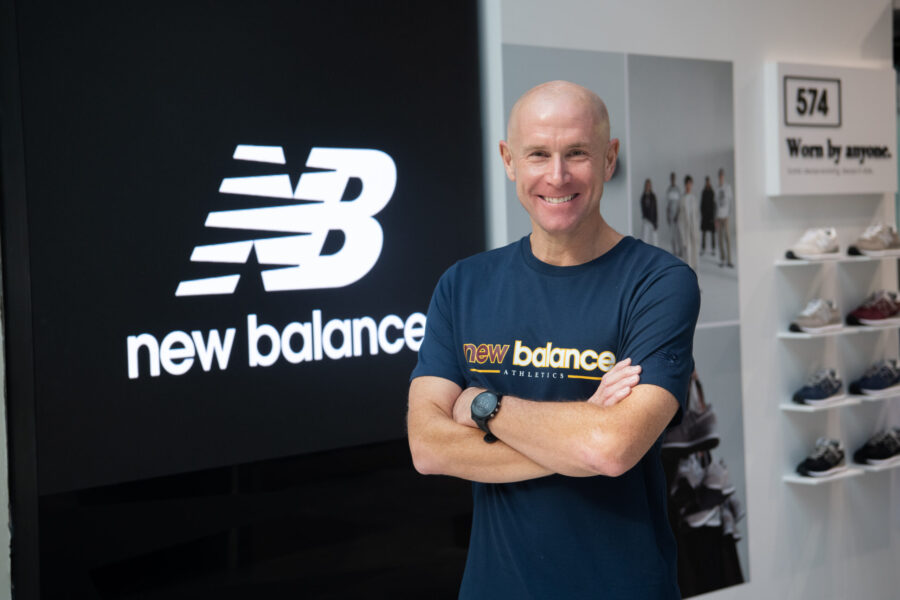
A few months ago, New Balance announced that it was opening a new store flagship store in Dubai Mall. With tens of stores in the country, this should technically not be a massive retail news, but it is. Why? Well, this store is unique not just in its look and design, but also in the way it is managed. Foraying into the direct-to-consumer model, this store will be New Balance’s first centrally run store i.e independent of a franchise partner.
New Balance Athletics, headquartered in Boston, MA was run and operated by its franchise partners Apparel Group in the UAE. Manufactured in the U.S. for more than 75 years, the brand also owns and operates four factories in New England and one in Flimby, U.K. New Balance employs more than 6,000 associates around the globe and in 2020 reported worldwide sales of $3.3 billion.
The flagship store in Dubai Mall aims to be a true statement about the direction the brand is taking and its presence in the Middle East. “One of the key things for us was to control our destiny in the region. We wanted to set up a regional hub here in Dubai to help provide the best service in the gulf market and Africa. The first thing was to set up a Middle East LLC and the next step was the flagship store,” said Stuart Henwood, General Manager of New Balance Middle East, Africa & India.
“It will be the first unique design of this particular ilk to be launched. It have a very eye-catching facade that will sit above the store, a digital portal entrance on the list line, and digital screen at the back of the store that will house some of our collabs and lifestyle products,” he said.
Many sporting brands have taken the D2C route in the past decade, having realised its opportunity to enhance engagement and build direct relationships with customers. Nike, for instance, remains bullish on the growth of its digital and direct-to-consumer (D2C) business projecting that digital will account for 50 percent of the sports apparel company’s business by 2025. Under Armour too restructures its brick-and-mortar business to leverage a direct-to-consumer (D2C) model that will help it reduce costs and reach younger customers.
“We are doing it under the ‘LLC’ in order to create a beacon for the brand across the region that will enhance the experience when it comes to brand visibility and also provide our partners with the belief and investment in the brand. For now, we don’t have the capabilties to open stores everywhere across the Gulf. So it is about controlling what we can do within the operations that we have and showing this is how we can execute the brand. The store in Dubai Mall is a huge step in the direction,” he explained.
Globally, sporting brands have turned to converting their stores into experience centres with many having huge football fields, basketballs courts etc. in order to engage its customers in the stores and keep them in longer. Would the new New Balance flagship be making investments in that direction?
“The most fundamental thing is to make the store profitable especially with the level of investment that occurs within the store. It’s about getting that balance between having an engaging environment that can draw people into the store and for customers to be able to feel and touch products that would push them to buy it,” he said. “We are a 115 year old brand and our idea is to allow the product to still be the hero in the store – which will be supported with best in class marketing assets, activations, and service.”
The pandemic accelerated New Balance’s capabilities to sell direct-to-consumer through e-commerce and through BOPIS (buy online, pickup in-store) and curbside pickup.
“With people either working out from home or working from home, we has seen a strong pivot towards athleisure sports wear. We’ve been well placed, as a result, it has fast tracked some of our expansion. Our flagship is one example, but also our five e-commerce streams that have been rolled out as a direct result of the pandemic is also testament to that. So we could attract new consumers to the brand,” he explained.
One of the things that New Balance takes pride in is the fact that 25% of its footwear are made in the USA or UK in collaboration with designers who have a unique point of view that resonates with its ‘community of customers’. However, the supply chain challenges that the world is faced with today has forced the brand to get creative with its production and manufacturing plans too.
“For a brand like New Balance, we’ve done a little work in the background for diversifying our sourcing by not being over-reliant on one market. While some of our hero products are made in the USA or UK, we are also very passionate about our domestic manufacturing capabilities. Dubai is a fantastic trade hub to navigate some of these challenges. We’re well positioned to service the Gulf and Africa,” he explained.
New Balance doesn’t take the word ‘community’ lightly and relies on it – going way beyond reward points – to retail its loyal customer base. “For us, it is about community. We engage with sports grassroots businesses and ultimately work towards bringing them to buy our products, whether on run clubs that we conduct in the UAE, Riyadh, and Qatar or through our other events. So it is about engaging the customers beyond the card. Our remit is to convert this community into New Balancers,” he concluded.